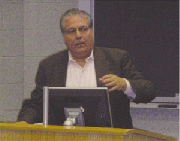
|
| The Arab American News publisher, Osama Siblani, spoke at UM-Dearborn on Tuesday about Pan-Arabism and the Arab Spring. |
DEARBORN — The Arab Student Union along with the Political Science Association and the Muslim Student Association at the University of Michigan-Dearborn invited the publisher and founder of the The Arab American News, Osama Siblani, to a forum titled “Pan-Arabism, the Arab Spring” on Tuesday, Nov. 29.
Siblani spoke on pan-Arabism and the current Arab Spring uprisings that have swept the region and captured the attention of international media and the world.
Pan-Arabism is a political movement that aims to unite Arab countries and Arab citizens of all backgrounds. While pan-Arabism was once very strong the effect of the philosophy has weakened throughout the years.
“Pan-Arabism, today, is in critical condition,” Siblani said, noting the sharp division and bickering between the Arabs.
Pan-Arabism was at its peak before the war of June 1967 between the Arabs and Israel, the Six-Day war that Israel launched against Syria, Jordan and Egypt under the leadership of Egyptian President Gamal Abdel-Nasser.
“Egypt at that time was the backbone and the driving engine of pan-Arabism,” he said.
However, the movement has since declined. Siblani blames outside sources for the division that has flared up between the Arab nations and subsequently divided Arabs and pitted them against each other.
“Arabs aren’t only divided along religious and sects lines, but also fragmented and divided by narrow regional and tribal boundaries.”
Siblani said that his own views and those of his newspaper, which has been published for 27 years and is the largest in the country of its kind, have been shaped by the pan-Arab movement that was inspired by Nasser in the fifties and sixties of the last century.
“I am the product of pan-Arabism,” he says.
He also said that the major objective of pan-Arabism was to unite Arab nations. But, after 1967 war defeat (Naksa) Pan-Arabism has weakened and is currently in critical condition, however it is not dead. Siblani seems optimistic about this movement making a comeback some day, however, saying, “I truly believe in pan-Arabism. It is the best and the most logical way to move forward and compete with the rest of the world.”
Siblani then discussed the events in the Arab Spring, starting with the Egyptian revolution in January of this year.
“When the Egyptian uprising broke out, I’ll admit, I was happy,” he says.
He said that there are usually two reasons to remove leaders from power: the first is for their domestic policy failure, e.g. bad economy, lack of freedom or opressive policies, and violations of peoples’ civil rights.
The second reason would be their foreign policy. Egyptian President Hosni Mubarak domestically did not take care of his people, his regime was floating on a sea of corruption and was oppressive and brutal. He catered to foreign interest and in particular Israeli interests (against those of the occupied Palestinians and to the detriment of his own people) to the point where most considered him a puppet to the Americans and a traitor to the Arabs, therefore he had to be removed, and the people of Egypt did just that.
Siblani joked, “The removal of Mubarak was the best thing since electricity.”
Each situation requires a different approach because each country has different needs and characteristics apart from their universal desire for freedom and human rights, however.
“You cannot apply the same rules in Yemen and Egypt that you do in Bahrain or Syria, for example,” he said.
“There are different needs for each country and different ways to achieve those ultimate universal goals of freedom and democracy.”
He also discussed how the people of the same nation can be divided and pitted against one another. He believes strongly that the Arab people should be always on guard and not allow foreign influence to dictate what happens within their nations. Democracy is welcomed, but it has to grow from within and can’t be packaged and exported by tanks and gunships.
Siblani gives an example of the Sunni-Shi’a rift that has been fueled and nurtured by outside power and is affecting the Arab and Muslim populations, putting the entire region on the brink of a bloody civil war. Even though the Arab nations have Muslim majorities, Christians remain an important factor of stability; however, Muslims have been pitted against each other along religious sectarian lines, even though to many Arab people this is not much of an issue.
As a solution to the divided Arab nations, Siblani says, “the moderate majority of the people of the region need to lead the effort for tolerance and reconciliation.”
“Freedom, independence and hope are the same everywhere, but the way to achieve them may differ in every country,” he says.
Siblani said, that revolution is not the only way to pursue and achieve desired and needed change.
“I am against changing regimes by distructive revolution, I am for changing regimes by evolution.”
He does not believe it is necessary to ruin a country and kill innocent people to change a regime.
The take-away point is that pan-Arabism can work but only if the Arab people are convinced that there is strength in unity and do not allow any outside countries or groups to influence their actions. Siblani is very hopeful for this movement, however, he is realistic. “This is going to be a very long struggle and very difficult time ahead.”
“Letting people pit us against one another and fight over little trivial things makes us lose focus on the main issues,” he says.
Siblani finished by thanking the students for their activism and stating that they are the future. He also said, “we should always be proud of who we are.”
He concludes, “We cannot live in a world where we cannot tolerate one another,” echoing the famous axiom, “United we stand, divided we fall.”






Leave a Reply